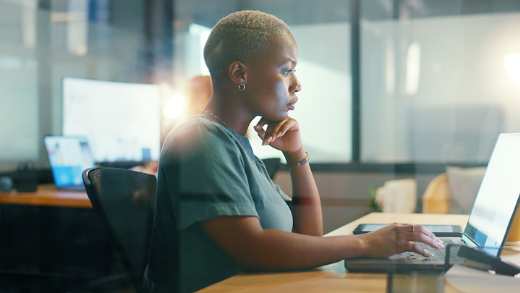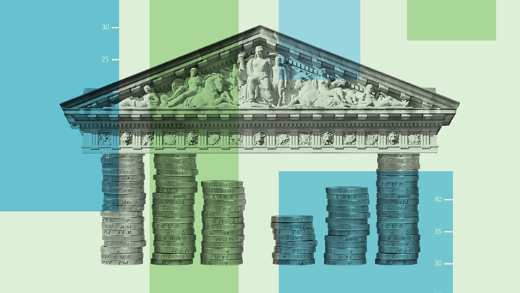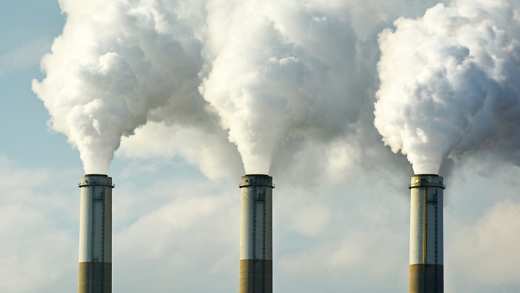Big challenges bring us the opportunity to think differently. Our investment teams reveal what they have learnt from COVID-19, and how they are preparing to face whatever ‘normal’ emerges in a post-pandemic world.
Living through episodes of great change is traumatic, as all the reassuring features that define our lives are stripped away. Unexpected risks and catastrophic outcomes can overwhelm. Despite this, surprising things can spring out of these painful episodes: new ideas, fresh ways to work and live.
Transcript
Transcript not available
“We should not underestimate human resilience and adaptability,” says Sunil Krishnan, head of multi-asset funds at Aviva Investors. “Certainly, it has surprised me over the last year, how well our teams and colleagues coped with the disruption, how our kids took it in their stride as they were wrenched away from friends and teachers for months at a time, or even how governments have responded to the risks of bankruptcies, with really aggressive changes in policy support. How our scientists took 15 years of vaccine development and crunched it into six months! All of that is an incredibly powerful lesson about how quickly things can change.”
With COVID, everything has shifted, as we explore in detail in AIQ: The Now Normal. While some contemplated how to stay afloat as their customers stayed at home, others flourished. All things digital had a shot in the arm. Industrial closures led to quieter streets and cleaner air, fuelling debate about opportunities for a green recovery.
Meanwhile, there were uncomfortable social revelations too. “We realised the tragic relationship between health and wealth,” says Mirza Baig, global head of ESG corporate research and stewardship at Aviva Investors. “COVID-19 has had disproportionate impacts on those in lower income and marginalised communities and accelerated long-standing trends in inequality.”
“Whatever way you look at it, the burden of this crisis has not been shared equally,” agrees Marte Borhaug, global head of sustainable outcomes at Aviva Investors. “It’s an unfortunate truth that vulnerable people, including women and ethnic minorities, tend to earn less, hold more insecure jobs or live close to the poverty line. These systemic issues make them more vulnerable to healthcare challenges or economic shocks. We cannot just combat the virus; we must address the inequalities of our time.”
Lockdowns and curfews. Riots around diversity and opportunity. Police warnings at wedding parties and snowball fights…What will ‘normal’ look like when it eventually returns?
Transcript
Transcript not available
A bigger role for the state
At a national level, the overwhelming theme has been ‘more government’. How to keep financial lifeblood flowing and how to administer have become more pressing during the health emergency.
“Central banks have been extremely accommodative, not just with conventional but also unconventional policy,” says Liam Spillane, head of emerging market debt at Aviva Investors. “In many ways that has allowed some of the more deteriorating fundamental stories to be – I don’t want to say ‘glossed over’, but at least ignored temporarily given the scale of policy support has been so large.
Right across the globe, borrowers now face a tsunami of debt
“Significant debt has been issued to fund healthcare, social programmes, to support markets and business,” he adds. “Right across the globe, borrowers now face a tsunami of debt. Although interest rates remain ultra-low, the ability to manage, consolidate and sustain that debt are critical issues.”
“The new levels of support we are seeing from the state have rewritten the rulebook when it comes to free market economics and capitalism,” says Steve Waygood, chief responsible investment officer at Aviva Investors. “Milton Friedman talked about the business of business being business. I think today he would recognise that free markets need government structure and at times huge government support to function.”
A bigger role for governments brings questions about competence and legitimacy. ‘How well has my government handled the pandemic?’ is a key question. “It’s come up every time there has been an election in the last six months, and I think that will still be the case over the next year,” Krishnan says. “The economic outcomes governments achieve and the stability of the environment are going to be a key focus over the next few years.”
National versus global interests
In the meantime, critical resource issues - access to personal protective equipment, oxygen and life-saving vaccines - continue to dominate the headlines.
Governments have focused on the domestic rather than the global good
“There’s been an admirable amount of cooperation between scientists during the pandemic, sharing the sequencing of SARS-CoV-2 and so on,” says Ian Pizer, senior multi-asset and macro strategist at Aviva Investors. “But governments have focused on the domestic rather than the global good. Many are becoming more open to using border closures to limit the arrival of new variants. We are also seeing issues around vaccine nationalism: there seems limited bandwidth to think about assisting others and reducing risks to the global population.”
Pizer believes this tone is likely to impact the corporate operating environment. “We are expecting to move back towards a more normal environment as the vaccine is rolled out, but the process will be bumpy and there will be setbacks. We should expect governments to continue to behave in this ‘national first’ way. That has quite profound implications for companies with international supply chains servicing international markets,” he adds.
Monitoring vulnerabilities
In a testing trading environment, corporate indebtedness has grown rapidly from what was already a large base in certain geographies and sectors, making it vital for investors to understand the operational nuts and bolts of those they invest in.
“You don’t know what is going to happen, but it is critical to try to envisage worst-case scenarios,” says Jaime Ramos Martin, global equity fund manager at Aviva Investors. “What are their polices? What’s the real state of the balance sheet, what could the impacts on P&L be?”
Portfolio management is particularly difficult in the current environment
Melanie Collett, managing director of asset management for Aviva Investors’ real assets business, agrees that portfolio management is particularly difficult in the current environment.
“Economic stability is not assured,” she notes, adding that the solution is to stay close to those most exposed to COVID changes, particularly occupiers in the retail and food and beverage sectors. “We are seeing an end in sight to this, but obviously the pace at which things will be normalised is still difficult to judge.” Much depends on how fast the production of COVID vaccines can be ramped up and distributed, and how much our desire to engage face-to-face returns.
Tomorrow’s world
Meanwhile, a striking number of factors have come together in early 2021. “We may have a lot more engines of demand in the global economy firing at the same time than we have seen in the past,” Krishnan says. “Governments may stick with their spending plans, households may find the savings they have put away may be gradually released as things start to look better, and companies may start to see a path for investing in 2022 and beyond. Put those things together and you have quite a strong engine of demand. That might be great news for companies, as long as they respond accordingly and as long as the supports are kept in place for long enough.”
The next decade might mimic the Roaring Twenties
Pizer is also contemplating if the pandemic might be followed by an economic ‘roar’, as people get back out to enjoy themselves. “I think we are going to see a resurgence of face-to-face meetings once we get through this,” he says. Might the next decade mimic the Roaring Twenties, which followed the devastation of the First World War and the horrors of the Spanish flu?
“Equities are expensive versus their historic valuations,” equity fund manager Giles Parkinson reminds us. “However, relative to bonds, and bond yields have gone even lower this year, equities remain good value, which creates a keener dynamic. Of course, the question remains – what happens if or when bond yields start to rise? That won’t be good for the stock market. This has been a factor since the financial crisis, but I have no particular view on whether 2021 is the year for that.”
“Even bigger challenges lie ahead,” Darryl Murphy, managing director of infrastructure at Aviva Investors, believes. “It’s not just about a post-COVID recovery. It is also about an acceleration over how we achieve net zero and the enormous investment required. As we move into that post-COVID world, that will come more and more into focus.”
“I am optimistic we will end the year with significantly enhanced net zero ambitions,” says Baig. “We need a more robust governance framework to hold countries accountable for those commitments, and I hope we will have the building blocks for a new global carbon tax.”
Transcript
Transcript not available
Will COVID-19 sustain interest in building back better? Will we grapple with destabilising inequality? How soon will policymakers unwind the legacy of the pandemic, and how painful will it be? Or, on a more personal note, how soon can I hug my granny?
“Let’s not lose the sense of urgency and shared purpose we’ve had,” says Krishnan. “If we can keep that sense of shared enterprise, it could be a wonderful time for the species.”



















